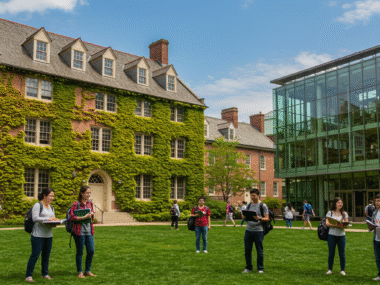Imagine stepping into a world where ancient traditions meet cutting-edge innovation, all within the vibrant halls of Africa’s most dynamic higher education scene—that’s the magic of studying at the best universities in Nigeria. As Africa’s most populous nation, Nigeria boasts a rich tapestry of academic institutions that have shaped leaders, innovators, and global thinkers for decades. Whether you’re a high school graduate dreaming of a bright future, a working professional seeking advanced degrees, or an international student curious about opportunities in West Africa, exploring the top Nigerian universities can open doors you never knew existed. In this comprehensive guide, we’ll dive deep into what makes these schools stand out, from their storied histories to modern facilities, helping you navigate the landscape of higher education in Nigeria with ease.
The Evolution of Higher Education in Nigeria
Nigeria’s journey in higher education is a fascinating story of resilience and growth. It all began in the colonial era when the first university, the University of Ibadan, was established in 1948 as a college of the University of London. Back then, the focus was on producing skilled professionals to support the British administration, but post-independence in 1960, things took off rapidly. The government invested heavily in education, leading to the creation of several federal universities aimed at fostering national development.
Today, Nigeria has over 170 universities, including federal, state, and private institutions. This expansion has been driven by a booming population and a growing demand for skilled labor in sectors like oil and gas, technology, agriculture, and healthcare. However, challenges like funding shortages, strikes, and infrastructure issues have sometimes slowed progress. Despite these hurdles, the best universities in Nigeria continue to excel, ranking highly in African and global lists. Organizations like the Times Higher Education and Webometrics evaluate them based on research output, teaching quality, and international outlook, making it easier for students to choose wisely.
What sets Nigerian universities apart is their blend of cultural heritage and modern aspirations. Many incorporate local languages and traditions into curricula, while also partnering with global institutions for exchange programs. If you’re searching for affordable yet quality education, Nigeria offers tuition fees that are a fraction of what you’d pay in Europe or North America, with many programs taught in English.
Read Also:
Criteria for Ranking the Best Universities in Nigeria
When we talk about the best universities in Nigeria, it’s not just about prestige—it’s about real value for students. Rankings consider several key factors to ensure fairness. First, academic reputation plays a huge role: How do employers and peers view the institution? Research impact is another big one, measuring publications, citations, and innovations that contribute to global knowledge.
Teaching quality is assessed through student-to-faculty ratios, graduation rates, and feedback from alumni. Infrastructure matters too—think state-of-the-art labs, libraries, and digital resources. Internationalization, such as student diversity and global partnerships, adds points, especially for those eyeing study abroad opportunities. Finally, employability seals the deal: Do graduates land good jobs quickly?
In Nigeria, the National Universities Commission (NUC) regulates standards, ensuring accredited programs meet quality benchmarks. For our list, we’ve drawn from recent 2025 rankings by sources like QS World University Rankings and African university leagues, focusing on institutions that consistently perform well. Keep in mind, the “best” university for you depends on your field of study, budget, and career goals—engineering might shine at one school, while arts thrive at another.
Top Federal Universities Leading the Pack
Federal universities form the backbone of Nigeria’s higher education system, funded by the government and often offering subsidized tuition. Let’s explore some of the standout ones.
University of Ibadan: The Premier Institution
Often called UI, the University of Ibadan stands as Nigeria’s oldest and most revered university. Founded in 1948, it transitioned to full independence in 1962 and has since produced Nobel laureates like Wole Soyinka. Located in the bustling city of Ibadan, Oyo State, UI spans over 2,500 hectares with lush greenery and historic buildings that give it a timeless charm.
What makes UI one of the best universities in Nigeria? Its academic prowess is unmatched, with over 13 faculties covering medicine, law, engineering, arts, and sciences. The medical program is particularly renowned, training doctors who excel globally. Research here is top-notch; the university hosts centers for tropical diseases and renewable energy, contributing to solutions for Africa’s challenges.
Student life at UI is vibrant, with clubs, sports, and cultural festivals like the annual UI Carnival. Admission is competitive— you’ll need strong UTME scores and post-UTME exams. Tuition for undergraduates hovers around ₦30,000 to ₦50,000 per session, making it accessible. Notable alumni include former presidents and tech entrepreneurs, proving UI’s role in shaping Nigeria’s elite.
For international students, UI offers exchange programs with universities in the UK and US, plus scholarships through bodies like the Tertiary Education Trust Fund (TETFund). If you’re passionate about research, this is your haven.
University of Lagos: Innovation in the Heart of Commerce
Nestled in Nigeria’s economic hub, the University of Lagos (UNILAG) is a beacon for aspiring business leaders and creatives. Established in 1962, it started with just 131 students but now boasts over 50,000 enrollees across 12 faculties. Its location in Lagos provides unparalleled access to internships in finance, media, and tech industries.
UNILAG excels in programs like mass communication, where students learn from industry pros, and engineering, with labs equipped for robotics and AI. The university’s Distance Learning Institute offers flexible online courses, ideal for working adults pursuing higher education in Nigeria. Research highlights include marine studies, given its coastal setting, and urban planning to tackle Lagos’ megacity issues.
Campus life buzzes with events like the UNILAG Fashion Week and sports competitions. Admission requires UTME scores above 200, plus a rigorous post-UTME. Fees range from ₦55,000 for arts to ₦70,000 for sciences. Alumni like musician Wizkid and banker Herbert Wigwe showcase UNILAG’s diverse impact.
For those interested in scholarships in Nigeria, UNILAG partners with organizations like MTN Foundation for merit-based aids. It’s also a top choice for international collaborations, hosting students from across Africa.
Ahmadu Bello University: Northern Nigeria’s Academic Giant
In the historic city of Zaria, Kaduna State, Ahmadu Bello University (ABU) reigns as the largest university in sub-Saharan Africa by landmass. Founded in 1962, it honors Nigeria’s first premier, Sir Ahmadu Bello, and serves as a hub for northern education.
ABU’s strengths lie in agriculture, veterinary medicine, and engineering, with faculties producing experts who drive Nigeria’s food security efforts. The university’s Institute for Agricultural Research develops drought-resistant crops, vital in a changing climate. With over 100 departments, it offers everything from pharmacy to fine arts.
Student experiences include cultural exchanges reflecting Nigeria’s diversity, with Hausa, Yoruba, and Igbo influences blending seamlessly. Admission is via UTME, with fees around ₦45,000 annually. ABU’s alumni network includes politicians like former Vice President Namadi Sambo.
Scholarships here focus on STEM fields, supported by federal grants. For global exposure, ABU has ties with universities in the Middle East and Europe.
Rising Stars Among State Universities
While federal schools dominate rankings, state universities offer localized excellence and often lower competition for admission.
Lagos State University: Affordable Excellence in the Metropolis
Lagos State University (LASU) in Ojo is a gem for those seeking quality education without leaving the city. Established in 1983, it has grown to serve over 35,000 students in fields like law, education, and management sciences.
LASU stands out for its law program, accredited by the Council of Legal Education, producing barristers who shine in Nigeria’s courts. The university emphasizes entrepreneurship, with centers teaching business startups amid Lagos’ vibrant economy.
Campus facilities include modern hostels and e-libraries, enhancing the learning experience. Admission is straightforward with UTME, and fees are about ₦25,000 for indigenes. Student life features debates and tech hackathons.
Notable for its community outreach, LASU runs programs in public health, addressing urban challenges. Scholarships from the Lagos State government make it accessible for top performers.
University of Ilorin: Discipline and Innovation Combined
Known as UNILORIN, this Kwara State institution is famed for its uninterrupted academic calendar—no strikes in over two decades. Founded in 1975, it focuses on agriculture, engineering, and health sciences.
UNILORIN’s veterinary faculty is among Africa’s best, with animal hospitals treating regional livestock. Research in renewable energy positions it as a leader in sustainable development for Nigeria.
With a student body of 50,000, the campus is serene, promoting focused studies. Admission requires high UTME scores, fees around ₦50,000. Alumni include tech innovators and public servants.
International students appreciate its stable environment, with partnerships for exchange programs.
Private Universities: Premium Education Options
Private universities in Nigeria provide world-class facilities, often at higher costs, attracting those seeking personalized attention.
Covenant University: Faith-Based Excellence
In Ota, Ogun State, Covenant University (CU) is a Christian institution founded in 2002 by Winners’ Chapel. It ranks high for its strict discipline and innovative teaching.
CU excels in engineering and business, with labs rivaling global standards. The university’s Total Man Concept integrates academics, spirituality, and skills training.
Fees are around ₦800,000 per session, but scholarships abound for brilliant students. Campus life includes leadership seminars and sports.
As one of the best private universities in Nigeria, CU produces graduates snapped up by multinationals.
Babcock University: Holistic Development
Located in Ilishan-Remo, Ogun State, Babcock University, established in 1999 by the Seventh-day Adventist Church, emphasizes health sciences and law.
Its medical school trains compassionate doctors, while business programs focus on ethics. Facilities include a teaching hospital and research centers.
Tuition is about ₦600,000, with merit scholarships available. Student activities promote wellness and community service.
Babcock’s global outlook includes partnerships with US universities.
American University of Nigeria: Global Standards in the North
In Yola, Adamawa State, the American University of Nigeria (AUN) follows a US-style curriculum since 2003. Founded by former Vice President Atiku Abubakar, it offers liberal arts education.
Strengths include information technology and entrepreneurship, with small class sizes for personalized learning.
Fees exceed ₦2 million, but need-based aids help. Campus is modern, with diverse international students.
AUN fosters critical thinking, preparing graduates for global careers.
Specialized Universities for Niche Fields
Some Nigerian universities focus on specific areas, making them ideal for targeted careers.
Federal University of Technology, Akure: Engineering Powerhouse
FUTA in Ondo State specializes in technology since 1981. Programs in civil, mechanical, and electrical engineering are top-rated.
Research in materials science drives innovation. Admission is competitive, fees low at ₦50,000.
Student projects often win national awards.
University of Agriculture, Abeokuta: Feeding the Nation
FUNNAB focuses on agricultural sciences, established in 1988. It develops high-yield crops and sustainable farming techniques.
Programs include animal science and agribusiness. Campus farms provide hands-on experience.
Affordable and impactful for rural development.
Student Life and Campus Experiences
Life at the best universities in Nigeria is more than classes—it’s about growth. Hostels foster friendships, while clubs range from debate to dance. Sports like football unite campuses, with inter-university games exciting events.
Cultural festivals celebrate Nigeria’s diversity, from Yoruba dances to Igbo masquerades. Challenges like power outages are common, but students adapt with generators and solar solutions.
For international students, orientation programs ease cultural shocks, and English proficiency is key.
Admission Processes and Tips
Gaining entry to top Nigerian universities starts with the Unified Tertiary Matriculation Examination (UTME) by JAMB. Scores above 180 qualify, but top schools demand 250+.
Post-UTME screenings test knowledge. Direct Entry for diploma holders bypasses UTME.
Tips: Prepare early, choose courses aligning with strengths, and apply for scholarships.
Scholarships and Financial Aid
Higher education in Nigeria is affordable, but scholarships make it easier. Federal options like the Bilateral Education Agreement cover international studies.
Private ones from Shell and Chevron target STEM. University-specific aids reward merit.
For women and minorities, programs like the Girl Child Education Fund help.
Challenges Facing Nigerian Universities
Despite strengths, issues like underfunding lead to poor infrastructure. Strikes disrupt calendars, though some schools like UNILORIN avoid them.
Brain drain sees lecturers move abroad, but reforms aim to retain talent.
Government initiatives like TETFund invest in upgrades.
Future of Higher Education in Nigeria
Looking ahead, digital learning is rising, with online programs expanding access. Partnerships with tech giants like Google enhance skills.
Focus on STEM and entrepreneurship prepares for a knowledge economy.
By 2030, more universities may rank globally, boosting Nigeria’s profile.
International Students: Why Choose Nigeria?
Affordable tuition, cultural richness, and English instruction attract foreigners. Visas are straightforward for students.
Programs in tropical medicine and African studies are unique.
Safety tips: Choose reputable schools in secure areas.
Comparing Public vs. Private Universities
Public ones offer low costs but larger classes. Privates provide better facilities at higher fees.
Choose based on needs—public for affordability, private for quality.
Notable Alumni and Their Contributions
From UI’s Chinua Achebe to UNILAG’s Funke Akindele, alumni inspire.
They lead in politics, entertainment, and business.
Research and Innovation Hubs
Top universities drive patents in biotech and renewable energy.
Collaborations with industries solve real problems.
Online and Distance Learning Options
Amid COVID, e-learning boomed. NOUN offers flexible degrees.
Ideal for working professionals.
Career Prospects After Graduation
Graduates enter booming sectors like fintech and oil.
Employability rates high for top schools.
Parental Guide: Supporting Your Child’s University Choice
Discuss interests, visit campuses, and plan finances.
Encourage independence.
Conclusion: Embarking on Your Educational Journey
The best universities in Nigeria offer pathways to success, blending tradition with modernity. Whether federal, state, or private, each provides unique opportunities. Research thoroughly, aim high, and embrace the adventure.
For more details, check out the National Universities Commission website here or explore QS Rankings here.











